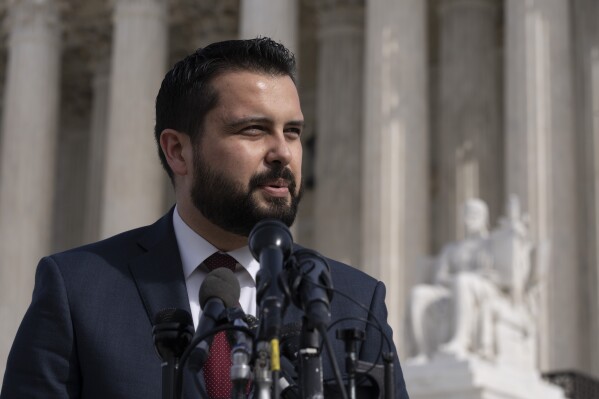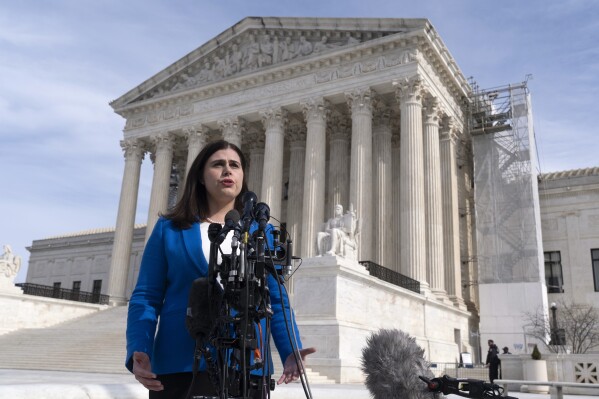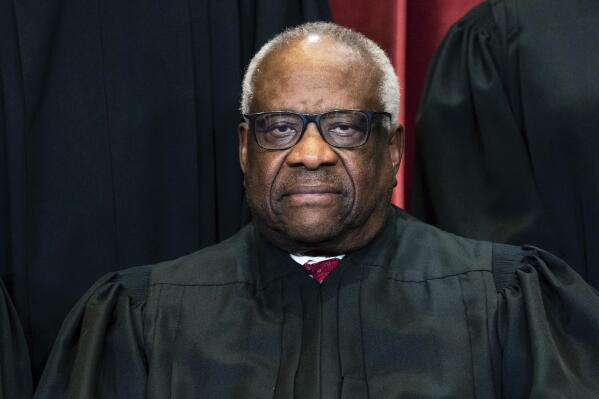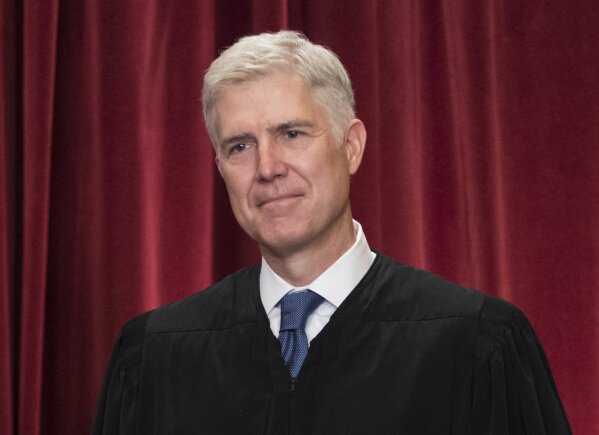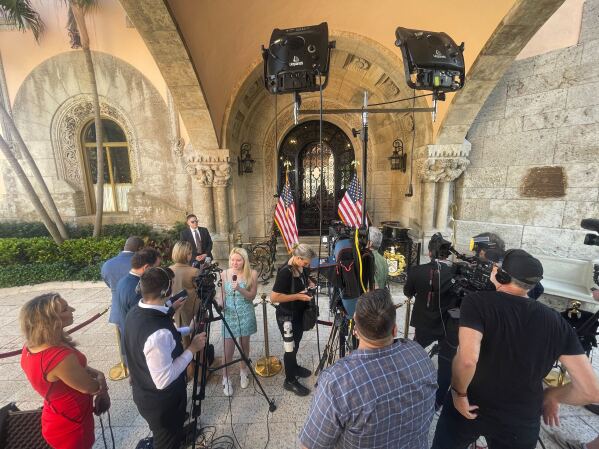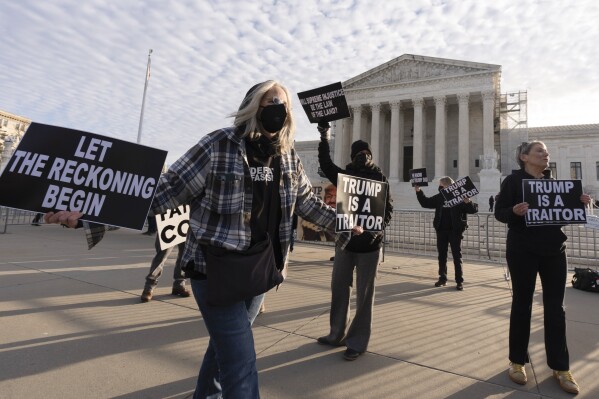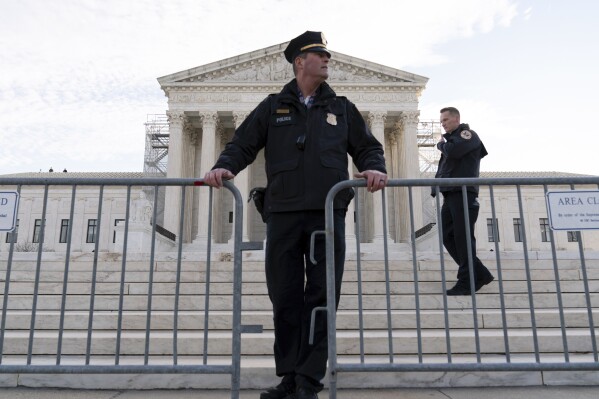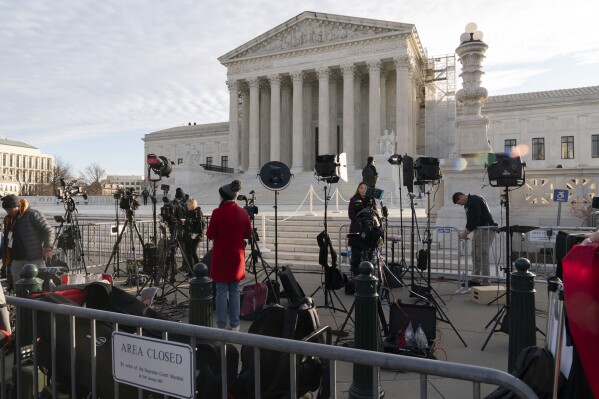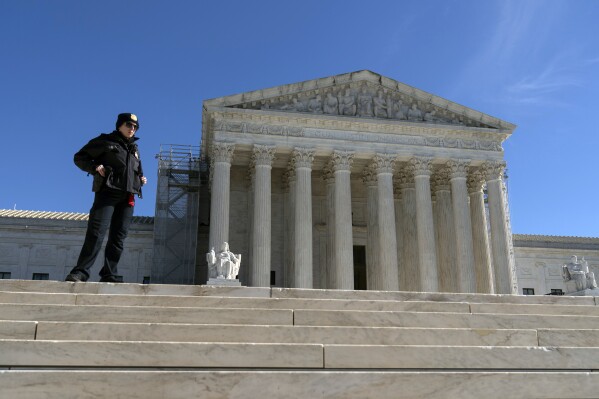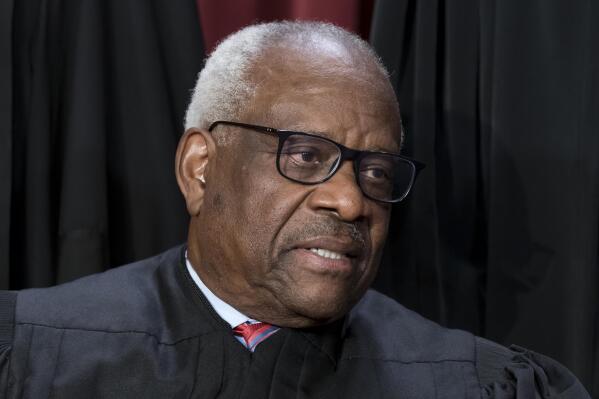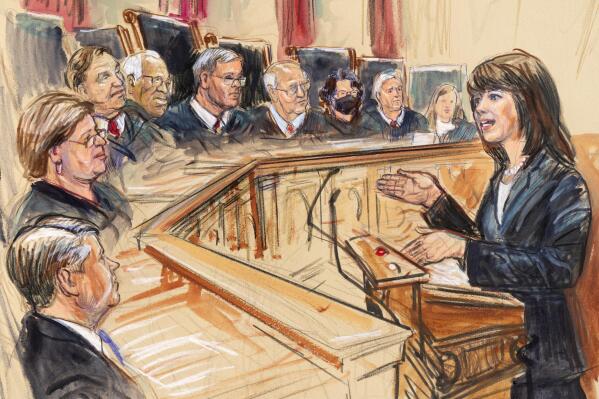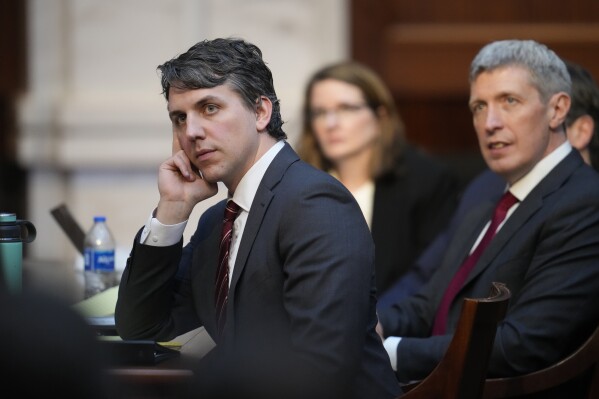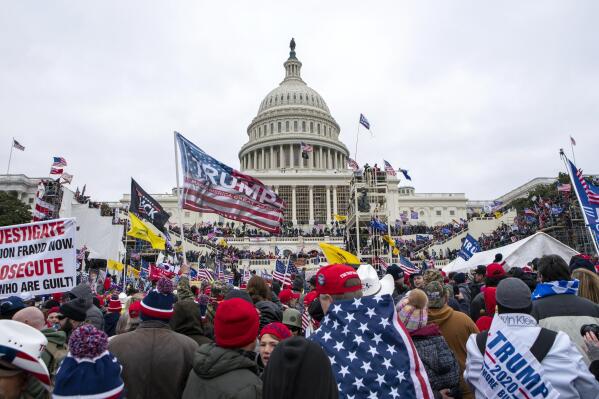Listen to the arguments in full
Oral arguments kicked off at 1:37:35 in the AP’s livestream below.
The fate of former President Donald Trump’s attempt to return to the White House is in the hands of the U.S. Supreme Court. Live updates: bit.ly/3T0EJbr
Colorado’s Republican Party chair is confident Trump will be on the ballot
Dave Williams, chair of the Colorado Republican Party, said he is confident the court will rule against what he cast as “ridiculous and novel legal theories to try and engage in election interference.”
And he says that he looks “forward to seeing Donald Trump on the ballot in Colorado.”
Colorado Sec. of State says it’s ‘striking’ to be discussing this case steps away from the U.S. Capitol
Colorado Secretary of State Jena Griswold said after Thursday’s proceedings that she hopes the Supreme Court will rule to “protect our democracy from the danger of another Trump candidacy and another Trump presidency.”
She told reporters outside the courthouse that it was “striking” to be standing steps away from the U.S. Capitol, which Trump supporters stormed on Jan. 6 in an effort to halt the peaceful transition of power.
She accused Trump of lying about his role that day.
“I think it’s just so outrageous that Trump continues to think that he is above the law, above the Constitution and above the court system,” she said. “We are only here because there’s an unprecedented situation: A president who decided that he would steal the presidency from the American people.”
Ahead of oral arguments, Justice Thomas quoted lines from a play about prosecution — it’s giving one of the plaintiffs a bit of optimism
By NICHOLAS RICCARDI
Krista Kafer, a former Republican congressional aide who is one of the plaintiffs suing to remove Trump from the Colorado ballot, entered the Supreme Court’s chambers and thought back to the last time she was in the room, 25 years ago.
She watched Justice Thomas chat with a group of law students about his favorite play, “A Man for All Seasons” by William Bolt. The play is about the prosecution of Thomas More, who was executed for not endorsing the divorce sought by King Henry VIII of England.
Kafer said she remained optimistic about the outcome of the case, despite the open skepticism of Thomas and the other justices.
She recalled Thomas quoting his favorite lines, in which More is asked by attorney Will Roper if he’d give the devil the protections of the law.
Here’s the exchange from the play:
More: What would you do? Cut a great road through the law to get after the devil?
Roper: I’d cut down every law in England to do that!
More: Oh? And, when the last law was down, and the devil turned round on you — where would you hide, Roper, the laws all being flat?
Inside the chambers, security roamed the aisles and the Justices cracked a few jokes
AP reporter Lindsay Whitehurst wasn’t allowed to bring electronics into the Supreme Court chambers during oral arguments.
Now that she’s out, she told us that a large group of onlookers including attorneys and members of the public were gathered inside.
And while security officers wandered the aisles to maintain quiet and decorum, the justices themselves were the ones to at times provoke laughter from the audience, making jokes at their personal expense.
Colorado lawyer says he ‘fully expected’ hard questions from the court
Murray, the attorney who argued Thursday on behalf of the Republican voters who want Trump off Colorado’s primary ballot, said he was confident in the case, despite the obvious skepticism from the justices.
Murray told reporters outside the Supreme Court that he has received “hard questions” from previous courts that ultimately ruled in his clients’ favor, noting, “You don’t do hard things without asking hard questions.”
He added, “Even though we are right on the law, we understand that what we are asking the court to recognize is something extraordinary: Which is that for the first time in our nation’s history, a major candidate for president of the United States is ineligible for that office under the Constitution.”
While he “fully expected” difficult questions, Murray said, “We’re confident that when the court looks at the law and digs into the issues, it will realize that we’re right and apply the law as it’s written.”
‘He should not be on the ballot. It’s very simple,’ says the case’s lead plaintiff
Lead plaintiff Norma Anderson called the proceedings “very intense” and said she noticed that each and every justice listened very closely.
“They were curious. They want to know what is their duty,” said the 91-year-old who formerly served as a Republican leader of the Colorado General Assembly and State Senate.
“He committed insurrection and he should not be on the ballot. It’s very simple,” she said. “If they truly believe in our democracy, they will accept it.”
Still, she added: “If they qualify him, then we just have to work very hard to beat him.”
Trump sounds a confident note about today’s arguments
Donald Trump was peppered with questions about tariffs, presidential immunity and his last remaining rival in the primary, Nikki Haley, as he addressed reporters outside of his Mar-a-Lago club following the Supreme Court arguments on the Colorado case.
Trump said he was pleased with his team’s performance after the justices appeared broadly skeptical of efforts to kick him off the 2024 presidential election ballot.
“I listed today and I thought our arguments were very, very strong,” he said.
“Can you take the person that’s leading everywhere and say, ‘Hey, we’re not gonna let you run’? You know I think that’s pretty tough to do, but I’m leaving it up to the Supreme Court.”
Trump was repeatedly interrupted by the booming sound of planes flying overhead.
WATCH: Demonstrators gather outside the Supreme Court
Dozens of demonstrators gathered outside the Supreme Court Thursday as oral arguments got underway over whether former President Donald Trump is ineligible to be president again and can be kept off the ballot. (Feb. 8)
Trump calls the Supreme Court arguments ‘a beautiful thing to watch’
Trump, who is speaking to reporters on today’s proceedings, called the Supreme Court argument “a beautiful thing to watch in many respects,” even as he complained about the case being brought in the first place.
“I hope that democracy in this country will continue,” he told reporters at his Mar-a-Lago club. Much of today’s arguments focused on whether his supporters’ efforts to halt the peaceful transfer of power after the 2020 election should bar him from the ballot in Colorado.
And with that, arguments have wrapped
By NICHOLAS RICCARDI
After a very brief rebuttal by Trump’s attorney, Mitchell, the gavel bangs down and the case is submitted to the court.
Arguments did not go the way the plaintiffs wanted. The main question now is how the court rules and what the implications of that decision will be for Trump and beyond.
Colorado’s Solicitor General argues that Section 3 is straightforward
By NICHOLAS RICCARDI
Colorado’s Solicitor General Shannon Stevenson is doing her best to convince the court that enforcing Section 3 is just as straightforward a job for states as enforcing on presidential candidates the constitution’s age limit of 35 years of age.
Justice Kagan contended that the 14th Amendment was designed to limit states’ powers and that determining who “engaged in insurrection” is “just more complicated and more contested and more political.”
Stevenson argued that it’s possible the question would be very straightforward – if a candidate came in and admitted he was an insurrectionist, there’d be little contesting.
Justice Alito asked about a persistent worry of justices, that other states would retaliate by trying to disqualify candidates they didn’t like. Stevenson argued, basically, trust the states’ election and judicial professionals to keep that from happening.
Colorado lawyer urges justices to resolve the issue before the election — or risk chaos
Under questioning from Justice Sotomayor on what the options will be if the court rules that states don’t have the authority to keep a candidate off the ballot, Murray said, “Certainly there are historical examples of members of Congress under Congress’ Article 1 power to judge the qualifications of its members, of members of Congress refusing to seat ineligible candidates under Section three who had won election.”
Suggesting a potential hypothetical, “What happens when members of Congress on January 6th, when they count the electoral votes and say we’re not going to count electoral votes cast for President Trump because he’s disqualified under Section 3 under the Electoral Count Reform Act?” Murray said a number of the amicus briefs have made the point “that is kind of disenfranchisement and constitutional crisis in the making and is all the more reason to address those issues now in a judicial process on a full evidentiary record so that everybody can have certainty on those issues before they go to the polls.”
The court sounds very open to leaving Trump on the ballot
By NICHOLAS RICCARDI
Just about every justice has asked pointed, skeptical questions of Murray. Even the Democratic-appointed ones haven’t thrown him lifelines.
Murray argues the only reason Section 3 hasn’t come up in the past 150 years is because no one engaged in an act as grave as Jan. 6. Justice Kavanaugh scoffed at that, noting that the reason is more likely because a judge in 1869 ruled that only Congress can create a process to disqualify officeholders and the law Congress passed to do that has sunsetted.
That may be a hint as to one direction the court could go to in disposing the case.
Arguments are stretching on past the 90-minute mark. Here’s where things stand.
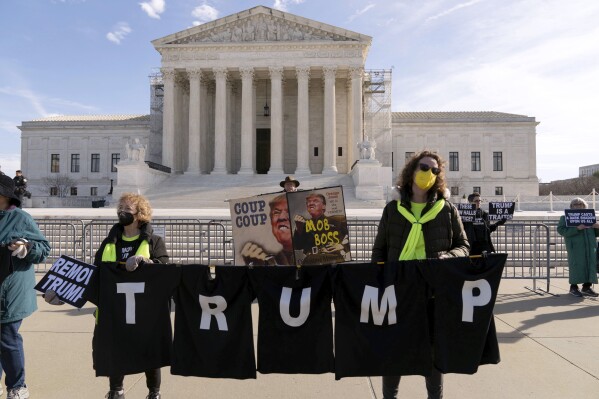
Demonstrators hold a banner outside of the U.S. Supreme Court, Thursday, Feb. 8, 2024, in Washington. The U.S. Supreme Court on Thursday will take up a historic case that could decide whether Donald Trump is ineligible for the 2024 ballot under Section 3 of the 14th Amendment. (AP Photo/Jose Luis Magana)
The Supreme Court sounds broadly skeptical of efforts to kick former President Donald Trump off the 2024 ballot.
In arguments ticking past 90 minutes, both conservative and liberal justices raised questions of whether Trump can be disqualified from being president again because of his efforts to undo his loss in the 2020 election, ending with the Jan. 6, 2021, attack on the U.S. Capitol.
Concerns included whether Congress must act before states can invoke a constitutional provision that was adopted after the Civil War to prevent former officeholders who “engaged in insurrection” from holding office again. There also were questions about whether the president is covered by the provision.
▶This is an excerpt from a longer story. Keep reading.
Trump’s campaign is fundraising off his planned remarks responding to the arguments
“I’m addressing the nation!” reads the subject line of an email sent to supporters.
Trump has chosen to skip the arguments in Washington and will instead address reporters at his Mar-a-Lago club in Florida before he heads to Nevada for tonight’s caucuses.
The former president has voluntarily attended hearings in other cases, which have proven a fundraising juggernaut for his 2024 campaign.
The email goes on, claiming, “They don’t just want to remove me from the ballot – THEY WANT TO ERASE YOUR RIGHT TO VOTE FOR ME! But what they don’t know is this: YOU WON’T LET THAT HAPPEN!”
A date that isn’t coming up in this argument: Jan. 6
By NICHOLAS RICCARDI
That’s bad for the plaintiffs trying to disqualify Trump. They want the focus on the legal issues around the attack on the Capitol, Trump’s culpability and whether it was an insurrection.
But the questioning has almost all been about technical, procedural issues, which are many of the reasons that Trump and others say the high court just shouldn’t go there.
The justices are plainly worried that they’ll open a Pandora’s Box if they uphold the Colorado ruling, allowing other states to disqualify people they dislike through whatever fact-finding procedures they see fit to use.
Murray keeps trying to bring the discussion back to Trump’s conduct, but not even the Democratic-appointed justices seem to be biting.
It’s always stressful to be grilled by your former boss
By NICHOLAS RICCARDI
The attorney representing those trying to disqualify Trump, Jason Murray, clerked for Justice Gorsuch when Gorsuch was a federal judge in Colorado. But he was squirming under Gorsuch’s questioning.
Under the plaintiffs’ theory, Gorsuch said, jumping off a hypothetical from Justice Alito, once a president commits insurrection, can’t any military official just refuse to obey his or her orders?
Murray kept suggesting other ways to ask the question and Gorsuch kept coming back to it. “Please don’t change the hypothetical,” Gorsuch said at one point, adding that he understood if Murray had no good answer, saying, “We’ll move on.”
Murray said that in the end, even a disqualified president remains president until impeached. “The person is in the office and even if they don’t have the authority to hold the office,” Murray said.
We’re still waiting to hear from Trump
By ADRIANA GÓMEZ LICÓN
It’s a small press pool today at Mar-a-Lago, but that doesn’t mean there’s a lot of space to sit down and file.
Colorado’s lawyers are up now — and fielding skepticism from the justices
By NICHOLAS RICCARDI
The attorney for the plaintiffs trying to disqualify Trump, Jason Murray, just started and immediately ran into very skeptical questions from the justices.
Justice Thomas asked for historical examples of states disqualifying federal officials under Section 3 after the Civil War. Murray could only come up with one, of a Georgia governor refusing to affirm the election to Congress of a former confederate.
The justices pounced. Why, Thomas and Chief Justice Roberts asked, would the writers of Section 3 want to give former rebellious states the ability to determine who can sit in Washington? Justice Kavanaugh noted that Section 3 includes terms like “insurrection” that require some sort of fact-finding.
“The question that you have to confront,” Justice Kagan said, “is why a single state gets to decide who can be president of the United States.”
“Ultimately it’s this court that’s going to decide that question of federal constitutional eligibility,” Murray said.
Trump’s lawyer argues Jan. 6 was not an insurrection
In response to the last question directed to him, Trump’s lawyer argued that the events of Jan. 6 did not qualify as an insurrection.
Justice Jackson said it did, asking, “What is your argument that this is not an insurrection?”
“For an insurrection, there needs to be an organized, concerted effort to overthrow the government of the United States through violence,” Mitchell said.
He went further, “We didn’t concede that it’s an effort to overthrow the government either. None of these criteria were met. This was a riot. It was not an insurrection. The events were shameful, criminal, violent, all of those things but did not qualify as an insurrection as that term is used in Section 3.”
Trump is expected to address the arguments in a press conference shortly
By ADRIANA GÓMEZ LICÓN
A group of 16 journalists is standing outside in a courtyard surrounded by palm trees outside the front entrance of Mar-a-Lago waiting for a press conference with former President Donald Trump.
Trump is expected to address reporters at Mar-a-Lago in response to the arguments before he heads to Nevada for Thursday night’s caucuses.
A broadly unlitigated clause adds uncertainty for how this plays out
By NICHOLAS RICCARDI
Trump’s attorney has suggested that requiring Congress to set up a procedure for determining if Section 3 applies to officials might lessen legal chaos. But Justice Amy Coney Barrett raised the possibility that it could create new chaos.
What if, Barrett suggested, the court agrees that only Congress can create a procedure to implement Section 3? And what if a future Congress creates one after Trump becomes president? Then it could apply it to him and remove him from the presidency without impeachment, right?
“I don’t know how that’d play out,” Mitchell said.
They talked about the possibility for a while, but there was no certainty from either party. That’s how it’s gone so far.
Now we’re getting to the core of Trump’s case
By NICHOLAS RICCARDI
Trump argues that Section 3 doesn’t apply to him. The presidency isn’t mentioned in the clause and he contends it doesn’t cover presidents. But, also, it only applies to people who swore an oath under a covered office.
Trump’s attorney contends that Trump is the only president since George Washington who didn’t hold a prior government office, so the clause can’t apply to him because it can’t apply to people who’ve only been president.
Justice Sonia Sotomayor called it “a bit of a gerrymandered rule designed only to benefit your client.”
“It does seem odd that President Trump would fall through the cracks,” Jonathan Mitchell responded.
But the text of Section 3 was a compromise, he added, and weird loopholes show up in the legislative process.
What to know about Griffin’s case
By NICHOLAS RICCARDI
There’s been a lot of discussion about Griffin’s case so far, the only significant federal case out there on section 3. Here’s the basics:
A Virginia man challenged his post-Civil War conviction by arguing that the judge who heard the case was a former Confederate and excluded from office under Section 3.
The then-chief justice of the Supreme Court heard his appeal as an appellate judge and concluded that that’d create legal chaos. He ruled in 1869 that Congress has to create a process to decide who’s an insurrectionist.
Congress swiftly did that in 1870, but the law was revoked in the 1940s. Trump’s lawyers argue no one can be disqualified until Congress acts again. The plaintiffs who want to remove Trump have noted that the same justice who ruled that Congress has to act had concluded Section 3 applied automatically in a prior case.
We’re hearing a lot about ‘Section 3′. Here’s the backstory
By NICHOLAS RICCARDI
FILE – Gerard Magliocca, a professor at Indiana University’s Robert H. McKinney School of Law, testifies during a hearing for a lawsuit to keep former President Donald Trump off the Colorado ballot, Nov. 1, 2023, in Denver. During the coronavirus pandemic, Magliocca began to research the history of two rarely noticed sentences tucked in the middle of the 14th Amendment. (AP Photo/Jack Dempsey, Pool, File)
This is the first time in history that the nation’s highest court has heard a case on Section 3, which was used to keep former Confederates from holding government offices after the amendment’s 1868 adoption. It fell into disuse after Congress granted an amnesty to most ex-rebels in 1872.
Before the violent Jan. 6, 2021, attack on the Capitol, even many constitutional lawyers rarely thought about Section 3, a provision that isn’t taught at most law schools and hadn’t been used in court for more than 100 years.
The clause’s revival is due to an unlikely combination of Democrats and Republicans, liberals and conservatives, all rediscovering 111 words in the nation’s foundational legal document that have now become a threat to the former president’s attempt to return to office.
Trump’s attorney is flagging a potential for legal chaos
By NICHOLAS RICCARDI
Justice Samuel Alito suggests that if the Colorado ruling stands, other states can also launch their own judicial proceedings about Trump’s qualifications.
Imagine, Mitchell says, if those judges elsewhere come to different conclusions than in Colorado — that Trump did not intend for Jan. 6 to become an insurrection, for example.
Left unsaid is the obvious — that’d create a wild legal checkerboard of decisions across the country.
These arguments are getting hypertechnical right out of the box
By NICHOLAS RICCARDI
The first wave of questioning is about Trump attorney Mitchell’s argument that a state can’t disqualify a candidate under Section 3, only ban someone from office — and it’s up to Congress to decide not to seat a federal official.
Chief Justice John Roberts asked Mitchell if a candidate came into an election office and said he lived out of state, could that election office bar him from the ballot?
No, Mitchell said. He later admitted this is a novel argument. “This is a one-off,” he said of the historic case.
First question comes from Justice Clarence Thomas
By NICHOLAS RICCARDI
Thomas asked Mitchell whether Congress needs to pass legislation for Section 3 to work.
“It is entirely up to Congress,” Mitchell responded.
In a sign of how weird this case is, he’s citing an 1869 case decided by a then-supreme court justice who was acting as an appeal judge. There’s very little precedent here.
And we’re off
By NICHOLAS RICCARDI
Arguments began with Trump’s attorney, Jonathan Mitchell, making his initial statement. “The Colorado supreme court’s decision is wrong and should be reversed for numerous, independent reasons,” Mitchell said.
Today’s session will begin momentarily — but expect a small delay in getting to the actual arguments
By NICHOLAS RICCARDI
Just in case there isn’t enough suspense today, the court’s historic arguments will be slightly delayed because the justices are issuing rulings on additional cases first.
The court has a backlog of decisions to issue. They’ve only put out one from this term so far. Reflecting the historic nature of the 14th Amendment challenge, they rushed to schedule Thursday’s hearing to help them deal with this case quickly. But before the arguments kick off at the scheduled 10 a.m. Eastern time, they’ve got to get some stuff off their plates first.
Scenes from the Supreme Court
By Associated Press
State election officials are hoping for a quick ruling on this case
By NICHOLAS RICCARDI
Both sides in the case want the Supreme Court to issue a definitive ruling quickly rather than kick the can down the road closer to the election. There’s another constituency pushing for that too — election officials.
Adrian Fontes, Arizona’s Democratic Secretary of State, said voters “need to know who they can vote for.”
“The court needs to act very quickly, and the court needs to act decisively,” said Frank LaRose, Ohio’s Republican Secretary of State, in an interview.
“It’s the responsibility of the United States Supreme Court to provide that clarity for election officials and voters and do that without delay,” said Jocelyn Benson, Michigan’s Democratic Secretary of State.
One thing to listen for: Which Justice will get the first question?
Almost everything at the Supreme Court is based on seniority, with the chief justice first among equals.
But after the lawyers make opening remarks, the next voice listeners will hear almost certainly will be the gravelly baritone of Justice Clarence Thomas. He has served longer than any of his colleagues and for years rarely participated in the arguments, saying he disliked the free-for-all and constant interrupting.
But when the court began hearing arguments remotely during the pandemic, Thomas began asking questions and hasn’t stopped. By informal agreement, the other justices stay silent to give Thomas first crack at the lawyers when the questioning begins.
In a second round, the justices ask questions in order of seniority, with Roberts leading off. Not everyone will necessarily have more to ask by this point.
Once both sides present their arguments, the lawyer for the party that appealed to the court gets a short, uninterrupted rebuttal.
▶ Want more tips for following today’s arguments? Check out the AP’s listeners’ guide.
When does this session start?
The court marshal will bang her gavel at 10 a.m. EST, but the livestream won’t start immediately. The justices will issue opinions in one or more cases argued earlier this term.
It could be a few minutes before Chief Justice John Roberts announces the start of arguments in Trump v. Anderson, as the case is called. The audio livestream at the top of this page won’t kick in until then.
The court has allotted 80 minutes for arguments, but in a case of such importance, the session easily could last two hours or more.
More telltale signs of a big case at the Supreme Court
By NICHOLAS RICCARDI
A bank of television cameras and journalists stood outside the barriers on the sidewalk closing off pedestrian access to the building. Adjoining streets were shut down for security and officers stood watch on both the courthouse steps and the building’s roof.
A small clutch of about a half-dozen protesters stood by the barriers in front of court with handwritten signs declaring, “Trump is a Traitor!”
There’s stepped-up security around the court today
There was heightened security in and around the Supreme Court Thursday, including the closure of some streets and stepped-up screening.
How 2 sentences in the constitution rose from obscurity to ensnare Donald Trump
By NICHOLAS RICCARDI
FILE – Gerard Magliocca, a professor at Indiana University’s Robert H. McKinney School of Law, testifies during a hearing for a lawsuit to keep former President Donald Trump off the Colorado ballot, Nov. 1, 2023, in Denver. During the coronavirus pandemic, Magliocca began to research the history of two rarely noticed sentences tucked in the middle of the 14th Amendment. (AP Photo/Jack Dempsey, Pool, File)
In the summer of 2020, Gerard Magliocca, like many during the coronavirus pandemic, found himself stuck inside with time on his hands.
A law professor at Indiana University, Magliocca emailed with another professor, who was writing a book about overlooked parts of the Constitution’s 14th Amendment. He decided he would research the history of two long-neglected sentences in the post-Civil War addition that prohibit those who “engaged in insurrection or rebellion” from holding office.
Magliocca posted a copy of his research — which he believed was the first law journal article ever written about Section 3 of the 14th Amendment — online in mid-December of 2020, then revised and re-posted it on Dec. 29.
Eight days later, President Donald Trump’s supporters stormed the U.S. Capitol to prevent the certification of his loss to Joe Biden. Magliocca watched as Republicans such as Sens. Mitch McConnell and Mitt Romney described the attack as an “insurrection.”
That night, Magliocca composed a quick post on a legal blog: “Section Three of the Fourteenth Amendment,” he wrote, “might apply to President Trump.”
▶ This is an excerpt from a longer story. Continue reading.
The Supreme Court hasn’t been this involved in the presidential election since Bush v. Gore
The case up for arguments today represents the Supreme Court’s most direct involvement in a presidential election since Bush v. Gore, a decision delivered a quarter-century ago that effectively delivered the 2000 election to Republican George W. Bush.
In Bush v. Gore, the court and the parties were divided over whether the justices should intervene at all.
The conservative-driven 5-4 decision has been heavily criticized ever since, especially given that the court cautioned against using the case as precedent when the unsigned majority opinion declared that “our consideration is limited to the present circumstances.”
In the current case, both parties want the matter settled, and quickly.
▶ Read more about how Trump’s ballot case compares to Bush v. Gore.
Some people have waited hours to secure a spot in the courtroom
By NICHOLAS RICCARDI
The Supreme Court has scheduled a special session to hear arguments over whether former President Donald Trump is ineligible to be president again and can be kept off the ballot, and spectators are lining up for a front row seat to history. (Feb. 7) (AP video by Rick Gentillo and Nathan Ellgren)
Interest in the case was so high that people began lining up outside the day before to sit in the courtroom when the justices hear arguments Thursday morning.
Miriam Minner and two of her friends from Cleveland had been waiting since Wednesday to get in.
“My dear friends and I are really big nerds and wanted a really cool experience,” Minner said.
“This is a landmark decision,” said Susan Acker of Cincinnati, “and I want to be in the room where it happens.”
Justice Clarence Thomas has ignored calls to step aside from this case given his wife’s support of Trump
By MARK SHERMAN, NICHOLAS RICCARDI
The wife of Justice Clarence Thomas urged the reversal of the 2020 election results and then attended the rally that preceded the Jan. 6, 2021 attack on the Capitol.
Ginni Thomas’ actions have prompted calls for the justice to step aside from the Supreme Court’s consideration of whether Trump should be disqualified from being president again.
But Thomas has ignored the calls and, in any case, the lawyers for the Colorado voters who sued to kick Trump off the ballot haven’t asked for Thomas’ recusal.
The Supreme Court has never considered the insurrection clause before
By MARK SHERMAN, NICHOLAS RICCARDI
It’s rare for today’s Supreme Court to take up a constitutional provision for the first time, but that’s exactly what will transpire in the dispute over Trump’s access to the ballot.
The 14th amendment was ratified in 1868, but the Supreme Court has never before considered Section 3, known as the insurrection clause.
With little in the way of prior court rulings, both sides are pointing to historical clues to argue for their reading of the provision, including how it was interpreted at the time of its adoption.
FILE – The Supreme Court is seen at sunset in Washington, on Jan. 24, 2019. The Supreme Court will be taking its first look in the 156-year history of the 14th Amendment at a provision, Section 3, that’s meant to keep former officeholders who “engaged in insurrection” from ever regaining power. The stakes couldn’t be higher in arguments taking place on Thursday, Feb. 8, 2024. (AP Photo/J. Scott Applewhite, File)
Two more state rulings are on hold until this appeal is settled
By MARK SHERMAN, NICHOLAS RICCARDI
Maine’s Democratic Secretary of State ruled that Trump was disqualified — a decision that’s on hold while Trump appeals.
A retired Republican judge in Illinois who was hearing the case for the state’s Board of Election also concluded Section 3 applies to Trump. (He recommended the board keep Trump on the ballot anyway because the courts should make the final decision.)
How soon will we see a ruling in this case?
By MARK SHERMAN, NICHOLAS RICCARDI
Both sides have agreed that the justices should issue a conclusive ruling soon. And the court is moving much faster than usual in scheduling arguments.
So a decision relatively soon is possible, if not likely, but the exact timing isn’t clear.
How has Biden weighed in on the ballot case?
By MARK SHERMAN, NICHOLAS RICCARDI
For his part, President Joe Biden has said that he thinks Trump engaged in insurrection, though he steered clear of the legal issues when asked about them in December in connection with the Colorado Supreme Court’s decision.
Biden told reporters that “certain things are self-evident. You saw it all.”
“Now, whether the 14th amendment applies, I’ll let the court make that decision. But he certainly supported an insurrection. No question about it. None. Zero,” he added.
Asked last week whether Trump should be allowed on the ballot, Biden replied, “As far as I’m concerned, that’s fine.”
One notable absence from today’s arguments
By MARK SHERMAN, NICHOLAS RICCARDI
Solicitor General Elizabeth Prelogar, the Biden administration’s chief Supreme Court lawyer, is widely considered one of the ablest high-court advocates. But Prelogar is sitting out the momentous case over whether a former president can be kept off the ballot based on a provision of the Constitution that has never been looked at by the Supreme Court.
The solicitor general is sometimes referred to as the 10th justice and the court frequently seeks her input on cases where the federal government is not directly involved but may still have a significant interest.
Still, this case is politically fraught. The court has not asked Prelogar to weigh in, perhaps in recognition that its decision could bear on the political fortunes of her boss, the president.
Here’s who’ll be presenting arguments in the case
By MARK SHERMAN, NICHOLAS RICCARDI
Jason Murray is arguing on behalf of the Republican voters who want Trump off the primary ballot.
Murray is making his first Supreme Court argument, but he is not unfamiliar to the justices. He spent a year at the court as a law clerk to Justice Elena Kagan, and he previously worked for Justice Neil Gorsuch when Gorsuch was a federal appeals court judge in Denver.
Colorado Solicitor General Shannon Stevenson, representing Secretary of State Jena Griswold, also will be making her Supreme Court debut. Stevenson has been in her job less than a year. She had been in private practice in Denver for 20 years.
What to know about Trump’s lawyer
By MARK SHERMAN, NICHOLAS RICCARDI
Trump is represented by Jonathan Mitchell, an Austin, Texas-based lawyer who is making his sixth appearance in front of the court, the first two of arguments he will present this month.
On Feb. 28, Mitchell will argue against the ban on bump stocks, devices that allow semi-automatic weapons to fire rapidly like machine guns.
Mitchell most recently argued in defense of SB 8, the Texas abortion law that essentially ended legal abortions in Texas months before the high court overturned Roe v. Wade in June 2022.
He also has served as Texas’ solicitor general and early in his legal career was a law clerk to Justice Antonin Scalia.
A simple primer to what’s at stake in this case
A victory for the Colorado voters would amount to a declaration from the justices, who include three appointed by Trump when he was president, that he did engage in insurrection and is barred by the 14th Amendment from holding office again. That would allow states to keep him off the ballot and imperil his campaign.
A definitive ruling for Trump would largely end efforts in Colorado, Maine and elsewhere to prevent his name from appearing on the ballot.
The justices could opt for a less conclusive outcome, but with the knowledge that the issue could return to them, perhaps after the general election in November and in the midst of a full-blown constitutional crisis.
The parties and their backers don’t split along predictable partisan lines
By MARK SHERMAN, NICHOLAS RICCARDI
The case has been brought by Trump critics who are registered as Republican and independent voters in Colorado, but organized by a liberal public interest group.
And the Colorado Supreme Court, which issued the initial ruling in this case, split 4-3 in ruling against Trump, though the seven justices were entirely appointed by Democrats.
Elected Republicans in Washington and around the country, as well as former Republican attorneys general and conservative interest groups have rallied to Trump’s defense. But some of the most vocal proponents of disqualifying Trump under Article 14, Section 3 are conservative legal theorists.
And former Republican governors and members of Congress have filed a friend of the court brief urging that Trump be disqualified.
At the heart of today’s case: A few lines of text known as the ‘insurrection clause’
By MARK SHERMAN, NICHOLAS RICCARDI
The case to be argued today stems from a section of the 14th Amendment that’s meant to keep former officeholders who “engaged in insurrection ” from regaining power.
The Colorado Supreme Court ruled that Trump should be disqualified because of his efforts to overturn his loss in the 2020 election, culminating in the Jan. 6, 2021, attack on the U.S. Capitol.
Trump appealed to the nation’s highest court, and both sides agreed that the justices should take up the case and issue a conclusive ruling soon.
▶ Just getting up to speed? Here’s what to know about today’s case.


